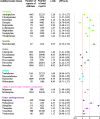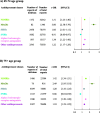Association between antidepressant use and delirium in older adults: an analysis of the World Health Organization's global pharmacovigilance database
- PMID: 38997635
- PMCID: PMC11241964
- DOI: 10.1186/s12877-024-05022-0
Association between antidepressant use and delirium in older adults: an analysis of the World Health Organization's global pharmacovigilance database
Abstract
Background: Psychoactive drugs frequently cause delirium adverse events in older adults. However, few data on the relationship between antidepressants and delirium are available. Here, we investigated the association between antidepressant prescription and pharmacovigilance reports of delirium in older adults.
Methods: Using the World Health Organization's VigiBase® global pharmacovigilance database from 1967 to 2022, we performed a disproportionality analysis in order to probe the putative associations between each antidepressant class (non-selective monoamine reuptake inhibitors (NSMRIs), selective serotonin reuptake inhibitors (SSRIs), serotonin-norepinephrine reuptake inhibitors (SNRIs), monoamine oxidase inhibitors (MAOIs), alpha-2-adrenergic receptor antagonists, and other antidepressants) and reports of delirium in people aged 65 or over. We calculated the reporting odds ratios (r-OR) and their 95% confidence interval ([95%CI]) with logistic regression models before and after adjustment for confounding factors. Secondary analyses were performed for each drug and within each class by age group (65-74, and 75 and over). We also studied the reports of concomitant delirium and hyponatremia.
Results: Our main analysis included 87,524 cases of delirium. After adjustment for confounders, a significant association was found between delirium and all antidepressant classes other than SNRIs. Intraclass disparities were found for the association between the most frequently prescribed antidepressants and reports of delirium. An elevated risk of reports of concomitant delirium and hyponatremia was found for SSRIs (4.46 [4.01-4.96]), SNRIs (1.25 [1.07-1.46]), MAOIs (1.72 [1.41-2.09]), and the "other antidepressants" class (1.47 [1.30-1.65]).
Conclusions: There was a significant association between reports of delirium and antidepressant classes (other than SNRIs). However, this association varied from one drug to another within a given antidepressant class. Moreover, this association could not always be explained by antidepressant-induced hyponatremia.
Keywords: Antidepressants; Delirium; Older adults.
© 2024. The Author(s).
Conflict of interest statement
The authors declare no competing interests.
Figures




References
MeSH terms
Substances
LinkOut - more resources
Full Text Sources
Medical

